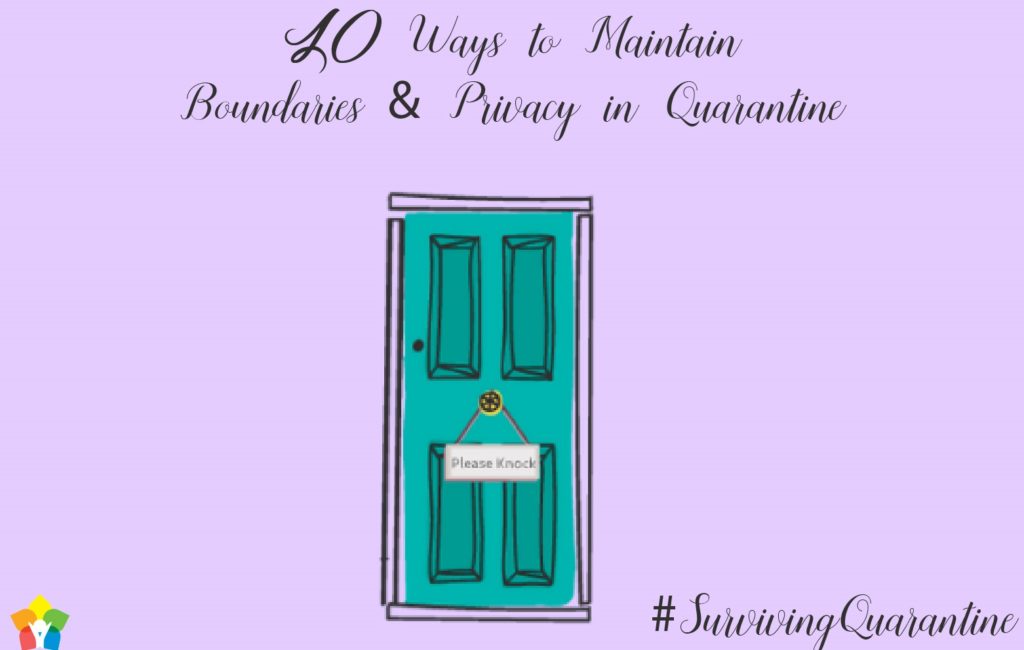10 ways to maintain Boundaries & Privacy in Family Situations in Quarantine

Even as you distance yourself from the rest of the world, you may find yourself in close quarters, maybe too close a quarter, with your immediate family. Both you and your children may be feeling a valid sense of lack of space and privacy, especially if the household includes a teenager.
Being able to move away to a place where you can catch a few moments of alone time in the presence of nobody but yourself can be important as you and your family attempt to negotiate the quarantine. It can allow you to collect yourself after an outburst to reckon with emotions you are feeling or have a private phone conversation or browse a website or book in peace or maybe you just have a song stuck in your head.
Guns & Roses were clearly onto something when they bellowed, “Everybody needs some time, On their own, Don’t you know you need some time all alone.”
Here’s 10 ways to maintain boundaries & privacy that may help you and your family survive quarantine.
1. Talk about Boundaries
Healthy Boundaries are not things that fall in place without having an actual conversation about it. And it is not a one-time conversation as well where you furnish out the rules. You will need to keep re-visiting it from occasion to occasion. It is good to define boundaries in a broad manner which includes no violation of physical personal space, no eavesdropping when someone is on the laptop or mobile, no rummaging through bags, wallets and other personal effects of others without permission. Even younger children can be taught about the concept of “personal space” and boundaries in a way that is easy to understand for them e.g. not to be too loud when the parents are on a call, not to touch parent’s devices when they are not at their desk etc.
2. Encourage Permission Seeking
If you see a closed door, knock first. If you want to use somebody else’s charger, make sure you seek permission first. You want to change the channel, make sure you check nobody’s watching what’s currently on. When in the slightest doubt, it’s always good to ask. Establishing permission seeking can help build trust and prevent violations of privacy and agency.
3. Don’t Get Suspicious
So you can hear the teenager whisper into the phone at night. When they enter the bathroom, it’s preternaturally quiet in there. Why did your teenager turn the phone away when they saw you walking in from behind? Here’s what to do:
- remember when you get too nosy, you are breaking the trust behind the boundary rules
- don’t let suspicion get the better of you
- attempt the conversation. It’s not going to be easy but it’s for the best.
4. The Rules apply to everyone
The Boundary Rules stand as long as everybody stands by them. They apply to the household equally. This will also help ensure that you are not being too tough on the kids.
5. Encourage being vocal & civil about Violations & Breaches
If someone feels like their privacy has been invaded, they should talk about it. They were wronged. They will be agitated. And maybe they need some quiet time. And it would be a good occasion for the family to have a talk about it and go over boundary rules again. Due and profuse apologies must be furnished by the party who caused the breach. Ensure that the incident is not repeated. The wronged party must forgive and everyone must keep peace.
6. The Bathroom is the Safest Space
Any private room would do, but since this piece of content is being written in Mumbai, we are just going to call it ‘bathroom’. Everybody gets X amount of time in the bathroom. Everyday. Undisturbed. Calm. Peaceful. Only an emergency should necessitate a knock or a holler.
7. Remind Each Other That You May Want to Take Some Alone Time
If you spot a flare up or a disagreement coming in, vocally remind that people may want to be alone with themselves for a while. Feeling agitated – Maybe it’s time to use the bathroom. Feeling restless – maybe you need some alone time in the bathroom.
8. Earphones & Volumes
We hope there are enough headphones in working conditions in the house. You will have to actively negotiate the sonic landscape for the house. You don’t want to hear your children’s favourite youtuber’s rant and they don’t want to listen to the Chief Minister’s daily address. The Permission seeking processes will really come in handy here.
9. What if you discover something you don’t approve of
If you are sharing spaces in close quarters and despite the best kept boundary rules, suppose you discover your child harboring a cigarette or condom or some weed. Or maybe you caught them watching porn or discovered they had a lover.
First, don’t lose it. It won’t help a bit if you lose it. And you cannot shout the good behavior into children anymore. If they name a friend, don’t call up that friend and create a ruckus there.
You will have to talk it through calmly. Recall how you hid some stuff from your parents in your childhood & teenage. This is no different and you will be an understanding parent who will talk it through with their child.
And also, if you broke a boundary rule when you discovered this information, you will need to apologize. (see Rule #4)
10. Try Not to Make That Face
Have you seen the Oscar-winning movie ‘Parasite’? Someone gets killed because he makes that face. You are in close quarters. You have been together uncomfortably long. Occasionally someone may do something cringe-worthy or maybe the sun is making them sweat and there’s a whiff of body odour. But do not make that face. It’s demeaning. A basic respect for all is the minimum.
***
(If you like this article, please consider donating to our ongoing donation drive to Help Families of Sexual Abuse Victims in Mumbai Survive the Lockdown)








